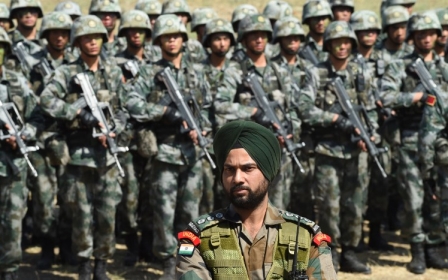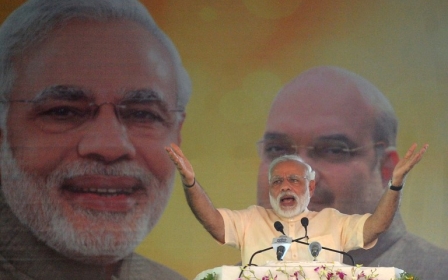India revives deal for Israeli missiles battle-tested on Gazans

India has agreed to revive talks to spend $500m on Israeli-made anti-tank missiles battle-tested in Gaza in an apparent reversal of a decision to pull out of the deal weeks ago, according to Indian media reports.
The revived deal, reported days before Israel's prime minister was due in Delhi, involves the sale of 8,000 Spike missiles through a government-to-government scheme, which stipulates any weapons bought have to be "battle proven".
The Spike anti-tank missile has been used by Israel in its wars in Gaza, which have been roundly condemned by rights groups and many states for breaches of human rights and the use of excessive force. According to Human Rights Watch, Israel had killed civilians using Spike missiles during its assault on Gaza in 2009 and 2014.
The Hindustan Times report came weeks after India's defence ministry dropped a half-a-billion-dollar deal to buy the Spike missiles direct from manufacturer Rafael, and said it would produce similar, but inferior, Nag missiles locally.
Rafael and Indian firms Bharat Dynamics Limited and Kalyani Strategic Systems have set up a factory to build the missiles in Hyderabad, under an initiative known as "Made in India", the newspaper reported.
Indian diplomats told the Hindustan Times on Wednesday that the ministry had no objection to the Indian army buying the Spike missiles.
The decision had been "discussed at the highest level", according to the newspaper, and comes days before the first visit to India of Benjamin Netanyahu, Israel's prime minister, to forge trade links in what is already Israel's largest arms market.
The Stockholm International Peace Research Institute, which documents arms sales globally, said Israel sold $599m of arms to India - about half of the $1.2bn in arms Israel sold around the world in 2016.
The Spike is currently made exclusively by Rafael in Israel. It can be mounted on drones and helicopters, or fired from the ground.
Human Rights Watch said it found "evidence" that the Israeli army fired a Spike missile in 2014 at a Gaza City pier, which killed four young boys.
"Evidence at the scene indicates that the attack was carried out with Spike missiles, which have sensors that allow the operator to see the target even after the missile is fired and divert them mid-course if the target is not clearly military," said HRW in a report.
Middle East Eye propose une couverture et une analyse indépendantes et incomparables du Moyen-Orient, de l’Afrique du Nord et d’autres régions du monde. Pour en savoir plus sur la reprise de ce contenu et les frais qui s’appliquent, veuillez remplir ce formulaire [en anglais]. Pour en savoir plus sur MEE, cliquez ici [en anglais].




